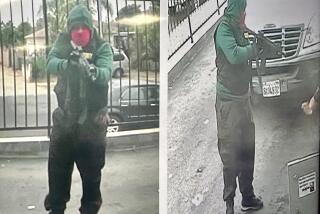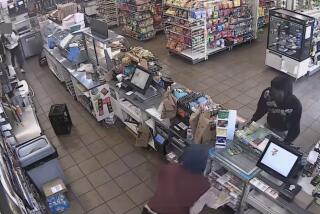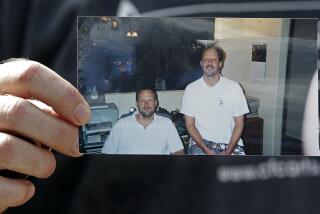Man Charged in Slot-Machine Scam Ring Enters Guilty Plea : Courts: Las Vegas resident is one of seven in alleged nationwide scheme to cheat casinos’ one-armed bandits.
- Share via
LAS VEGAS — One of seven Las Vegas residents indicted in a national slot-machine scam that authorities say netted more than $5 million has pleaded guilty.
Charles Denton Clark pleaded guilty Tuesday to one count of interstate transportation of stolen property, a crime punishable by up to 10 years in prison and a $250,000 fine. He is the only one of the seven to enter a plea agreement thus far.
The FBI has said devices being developed by the group could cause serious financial damage to casinos in Nevada and nationwide.
According to court records, Clark, 38, acted as a blocker, lookout and chauffeur for his co-defendants. A blocker obstructs the view of surveillance, security and slot personnel while slot machine cheaters operate.
Clark got 10% to 20% of the stolen proceeds, court records show.
According to the FBI, members of the Las Vegas Metropolitan Police Repeat Offenders Program received information that a group of people with prior convictions for cheating slot machines was operating again. The police, the Gaming Control Board and the FBI launched a joint investigation into the group’s activities.
In July, six Las Vegas residents, including Clark, were arrested on federal charges of interstate travel in aid of racketeering, interstate transportation of stolen property and money laundering. The seventh was arrested Tuesday.
Arrested along with Clark were Ramon David Pereira, 52; Lisa Jane Luxom, 30; Richard Allen Ealey, 45; Tommy Glenn Carmichael, 49; and Raul Ricardo Lescano, 40.
Clark was arrested when he called police to report a prowler and the officers discovered a warrant for his arrest.
Michael Joseph Balsamo, 40, was arrested Tuesday night in Phoenix.
According to a search warrant, group members victimized casinos in the United States and Canada from 1974 to 1998.
The members used everything from string, wires, magnets and coat hangers to build devices to defraud slot machines. They also “tilted” slot machines by using battery-operated, optical and electrical devices, the warrant states.
Members of the group were “in the early stages of developing a computer-generated device that can defeat various slot machines without apparent tampering, possibly by remote control,” according to court records.
More to Read
Sign up for Essential California
The most important California stories and recommendations in your inbox every morning.
You may occasionally receive promotional content from the Los Angeles Times.










